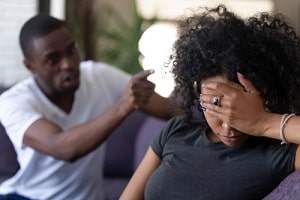What Can I Do If I Am in an Abusive Relationship?

Unfortunately, domestic violence is all too common in the United States and across the world. According to the data from the Illinois Coalition Against Domestic Violence, one in three women and one in seven men are victims of domestic violence. Many believe that women are the only victims of abuse, but this is not the case. Though more women suffer from abusive relationships, men are not excluded from this unfortunate reality. Abuse includes more than just physical violence against another person — there are many types of abuse and knowing the tell-tale signs is a good way to make sure that you are not in an unhealthy, toxic relationship.
Identifying Abuse
- It can be difficult for those who are not in abusive relationships to understand why someone who is in one would remain in one. The emotional connection that one has with their partner, even if they are abusive, is often enough for someone to stay with a partner who does not treat them like they should. For some, they may not know the signs of abuse and think that they are blowing things out of proportion — no one wants to admit that they are in an unhealthy relationship, so some ignore these signs even if they know that they are there. The following are signs of an abusive partner:
- Constantly tells you that you never do anything right
- Discourages or prevents you from seeing your friends and family
- Demeans, insults, or shames you consistently
- Has control over your finances
- Controls who you spend your time with, where you go, and what you do
- Acts in ways that scare you
- Intimidates you with their words or actions, including threats with weapons
I Need Protection
In many cases, ending an abusive relationship can be emotionally and physically difficult. Identifying that you are in a toxic relationship is the first step to moving forward, but rarely does an abusive partner let the person go based on their word. This can lead the abused partner into dangerous situations. In order to combat possible threats or violence, Illinois offers family or household members the opportunity to obtain orders of protection. Commonly known as a restraining order, protective orders may do the following:
- Forbid the abuser from making future threats or abuse
- Prohibit the abuser from a shared residence
- Require the abuser to stay a certain distance away from their previous partner
- Grant the abused party sole parental rights
- Require the abuser to attend counseling
- Prohibit the abuser from being able to access their child(ren)’s records
- Require the abuser to give any guns or weapons to law enforcement
Call a Joliet Order of Protection Attorney
It can often take abuse victims months or years to recognize the domestic violence that is occurring in their house, and even longer to take action against their abuser. This can be the most difficult decision for abuse victims to make — turning against the person they love because their relationship is unhealthy. The best way to ensure that you are safe from your abuser is to seek an attorney’s help in filing for an order of protection. The Foray Hurst Firm is committed to protecting our clients and will help determine which path is best for your situation. For assistance obtaining an order of protection, contact our Will County orders of protection lawyers at 312-702-1293 to schedule a consultation.
Sources:
https://illinoisattorneygeneral.gov/women/ordersofprotection.html
https://www.thehotline.org/is-this-abuse/abuse-defined/
https://www.ilcadv.org/








